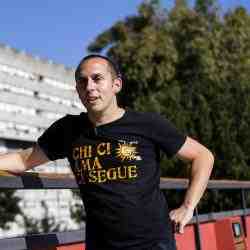Introduction
Through a community pact, Ernest is designing a new social infrastructure in inner-city neighbourhoods aimed at fostering self-efficacy, cultivating a sense of social responsibility, and empowering young people to lead community development initiatives. Collaborating closely with parents, schools, and community groups, Ernest is revolutionizing the youth service ecosystem, by harnessing the vigour of young people to bring about change, rather than treating disadvantaged youth as charity cases.
The New Idea
In urban poverty-stricken areas, young people are too often exposed to and at risk of being involved in gang violence and feel neglected due to a lack of meaningful development programs. Along with their parents, many low-income youth accept the conditions they have inherited because the system around them provides insufficient opportunities for upward mobility. Through his organization, Les Ballons Intensifs (LBI), Ernest is enabling multiple levels of transformation for young people through a community pact. Signing a contract with both youth and their parents allows youth to develop a sense of agency and purpose while leading community change efforts in close collaboration with local organizations.
The youth experience with LBI is channelled through Ernest’s three-pronged and long-term approach of personal transformation, social commitment, and creative engagement (changemaking). Ernest leverages free top quality sports programs in exchange for youth’s commitment to initially learn about, then participate in, and ultimately lead community well-being initiatives. Supplemented with cultural outings and personal development sessions, LBI ensures that low-income youth are not just passive participants but are purposely woven into community development programming, letting them experience how to effectively work with community organizations to increase collective impact. LBI’s high-quality programs, trained coaches, and the use of new equipment, although symbolic, influence LBI youth to begin seeing themselves as valued members of the community instead of feeling neglected. Ernest is giving youth, living in environments where few people have expectations for positive future outcomes for them, the opportunity to believe in themselves and set the bar high.
By strictly working within economically disadvantaged neighbourhoods, Ernest’s community pact is restoring community outlook. Parents whose children participate in LBI programs are engaged as strategic leverage and beneficiaries. While programs are offered for free, parents are required to support their children to abide to the standards outlined in the community pact: taking care of oneself physically and emotionally, and showing up on time to LBI sports training and community engagement hours with a committed mindset. Since many working-class parents work multiple jobs to make ends meet, many don’t have the time or energy on weekdays to stay engaged with their children’s’ progress. As such, Ernest and his team are consciously meeting parents when and where it is conducive to their demanding and stressful schedules in order to keep them involved. In working with parents, LBI is also reclaiming seats on school parents’ committees, public school service centres (the equivalent of school boards in Quebec), and youth organizations to bring their historically dismissed voices and opinions into governance structures to tip the scale of governing bodies that are too often composed of upper-class parents. As a result of strong community buy-in and continued increase in demand, Ernest has expanded his LBI summer camp model to the rest of the school year by partnering with high schools to leverage key existing infrastructures and resources during the winter months.
In the areas where LBI operates, Ernest has proven through his community pact that along with parents, institutions, and charitable players, people can better work together to positively affect the lives of children. LBI empowers parents and youth to be part of decision-making structures to change how services are delivered to low-income areas. To set the example, Ernest and his team leverage their positions on school governance and youth-focused civil society boards to ensure that decisions regarding policies and practices also represent the opinions of marginalized communities. Concurrently, LBI youth learn to move away from the preconceived notion that they have to wait for charitable help, and instead, they learn how to catalyze their collective energy to claim their space in community well-being efforts. To enable young proximate leaders in other provinces to take on his model and change their respective communities, Ernest is currently putting in place the LBI Ambassador program.
The Problem
The challenges faced in underprivileged urban neighbourhoods are multiple, complex, and hinder the development of young people who live there. Montreal is Canada’s second most industrial and populous city and as reported by Statistics Canada, is home to more than half of all people who live in poverty in the province of Quebec, and over a third of all low-income neighbourhoods in Canada. Growing income inequality, coupled with public policies that tend to block lower-income households from living in middle- and upper-income areas have accentuated the concentration of poverty and increased income segregation. A high percentage of racialized people and immigrant families make up the composition of areas with moderate to high concentration of poverty. In these areas, city programs are scarce, and youth underestimate their abilities or simply do not believe that they possess the power to improve their situations.
Without the opportunity to develop self-efficacy, many youth are deprived of a perception of control and believe that failure is inevitable in the face of the complex social challenges around them. Beyond sports and recreation, cultural development opportunities are mainly available to affluent families or youth that are part of accelerated academic development pathways such as the International Baccalaureate. Low access to such opportunities is a particular issue during the school summer break when children are out of class for two to three months. At the municipal levels, infrastructure distribution aggravates the problem. Based on a CBC News study from 2021, there is a direct correlation between a borough’s average income and the number of recreational opportunities in the area. This inequity leaves families who cannot afford to pay for youth activities with little options to get their kids involved meaningfully in their communities.
In addition, several studies indicate that youth living in underprivileged neighbourhoods may show lower levels of self-esteem and aspiration, greater risk of adaptation or learning disabilities, higher risk of dropping out of school, as well as risk of delinquency and being involved in gang violence. According to the Montreal police department, lack of self-esteem, gaps in care for youth, and precarious financial situation are three factors that often correspond to the emergence of adjustment problems related to delinquency. While police in Montreal are increasingly imposing invasive crime prevention measures to fight gun violence with little to no community consultation, areas of concentrated poverty receive little support for community development or infrastructure projects for social change.
In many poor neighbourhoods, the reality for parents is burdensome. According to data from Statistics Canada 2016, housing costs represent around 80% of income for a fifth of the poorest Montrealers. Low-income parents—often depending on a single income source—work long hours and part-time jobs just to cover basic household expenses, let alone pay for activities for their children. A 2014 study from the School Community Journal found that immigrant parents in Quebec shy away from becoming involved in school decision-making committees due to a lack of capacity related to work and household commitments. For racialized and low-income parents, a lack of parental involvement in schools and activities may also be due to systemic inequality and difference in patterns of communication with teachers or community programs. From a generational perspective, high levels of poverty can become a vicious cycle that keep people powerless and prevent them from fully participating as citizens in society. The compound effects on youth are detrimental and influence several areas of life including housing conditions, food security, physical and mental health, academic success, and life expectancy.
The Strategy
Growing up in the low-income borough of Pointe-Aux-Trembles in Montreal East, Ernest knew firsthand how much a comprehensive approach was needed to address the problems faced by youth in concentrated poverty. From the early days of LBI, he was convinced that youth had a key role to play in solving the challenges they faced as opposed to perpetually living in a system that relied on charitable giving and short-term public solutions. To get there, Ernest also knew that a mindset shift was necessary from community members. By raising expectations and building trust through LBI’s community pact, Ernest utilizes high-quality free sports programs as a means of encouraging young people to first gain knowledge about, then take part in, and eventually lead initiatives that promote community well-being. To develop self-efficacy, Ernest’s long-term approach puts personal transformation as the foundation for social commitment and creative engagement (changemaking).
To respond to the requests of his cousin and other kids from his neighbourhood to learn basketball during the summer break, Ernest started the LBI summer camp program in 2013. From the name and the branding of the organization to fund-raising campaigns to fund the program, LBI began and continues to operate under a youth-led approach and youth decision-making. By signing a contract with LBI and their parents, youth aged 11 to 19 pledge to participate in training lessons starting at 6 a.m. every weekday of the summer. Because LBI places a high level of trust in the capacity of young people at the centre of their programming, this agreement was, and continues to be, the initial bond between beneficiaries and the organization to set high standards in an environment in which it is lacking. In exchange for sports programs in the morning, the LBI camps offer community engagement opportunities in the afternoon such as community clean-ups, gardening, cultural trips, and development workshops. Their development workshops are specifically designed to improve competencies in navigating physical and mental health, promoting healthy lifestyles and habits, establishing personal discipline, and understanding how to engage with community programs.
While programs are offered for free to low-income neighbourhoods, setting high expectations becomes a collective value to foster commitment on the part of everyone involved (youth, parents, LBI staff and coaches). From there, social commitment is practised through recurring volunteering activities and community projects led by LBI or local partners. For instance, in partnership with DéfPhys Sans Limite, a non-profit organization that promotes social inclusion for people with disabilities, LBI youth participate in outdoor social activities, act as companions to support DéfPhys Sans Limite’s members, and contribute to their fund-raising campaigns to sustain the organization. LBI has established local partnerships like these with elementary schools, high schools, community centres, low-income housing programs, and community organizations across their program locations. Through these partnerships, Ernest is also ensuring that projects and activities are delivered with quality in mind. This symbology is critical at LBI because it is how they change youth perceptions of themselves from charity cases to contributing members of society. Because LBI frequently partners with local actors, the symbology has influenced community organization and schools to change their method of operations to design quality programs that truly reflect the needs of their beneficiaries. An example of this is how some high schools consulted LBI on how they can better attract and retain low-income youth participating in after-school activities. This resulted in the schools investing more money in quality equipment and changing their payment methods to allow parents to pay a small amount at the beginning of each session to incrementally cover the total cost of their children’s registration as the year goes on.
Finally, creative engagement (changemaking) is the last step in Ernest’s transformation philosophy which represents an incarnation of his experience: “a regular kid from the community who sought out to bring positive change.” With a newly acquired sense of purpose and with adequate know-how, LBI youth are able to co-create and lead projects and endeavours they deem best to address local challenges. For instance, two LBI alumni started a non-profit organization called My Mental Health Matters, to raise awareness about mental health for young people from diverse cultures and act as a resource hub for racialized youth seeking culturally relevant psychosocial services. Another youth currently involved at LBI recently started an initiative offering hygiene and care kits that contain essential relief items for people who experience homelessness in her community.
Ernest’s community pact has also had great impacts on parents whose children are involved at LBI. Even though it is free, parents are met with quality engagement as if they were paying customers. By continuously listening to parents’ needs and feedback, Ernest and his team have adapted their communication practices to parents’ realities. Since many low-income and immigrant parents work blue-collar jobs, very few use email. As a result, LBI communicates strictly via instant messaging systems or apps such as SMS and WhatsApp to share progress and documentation. To accommodate their schedules, LBI hold parent meetings outside of periods filled with work and household commitments such as Sunday afternoons. With heightened involvement, parents feel a greater sense of community and actively support LBI during local events, community potlucks, and with donations. In the areas where LBI is located, general citizens’ perceptions have shifted towards a better community spirit because young people are now seen engaged in the daytime in parks as opposed to nighttime. Thanks to LBI, residents feel a better sense of belonging and connectedness, which are characteristics lacking under the status quo for low-income boroughs. The long-term and enduring investment in each youth has led many of them to start and lead acclaimed community projects, set up online stores to sell their crafts, and even establish storefront businesses. One LBI alumni became a successful barber and opened the second location of his successful business in the neighbourhood of Pointe-Aux-Trembles where he originally benefited from Ernest’s programs as a teenager in the early days of the organization.
Since LBI coaches spend a lot of time with youth and get to know them personally, Ernest has set up partnerships to ensure that coaches are trained in mental wellness and can foster a safe environment within programs. These partnerships are with key industry experts such as Bell Let’s Talk, Canada’s largest corporate commitment to mental health, and Pour3Points, an organization that enables coaches to become life coaches. This is how Ernest delivers excellence in the accompaniment of youth’s transformation; by ensuring that adults are not only trained to deliver physical sessions, but have the necessary skillset to conduct first aid, offer psychosocial support, serve as a sounding board, and respond in cases of abuse, harassment, and violence. Coaches are an integral part of the community pact, and they represent the organization during frequent engagement and follow up with parents. To make sure that the community pact also benefits coaches and that they show up motivated, LBI is remunerating them with an adequate wage. In comparison with high school coaches, LBI has recently surpassed market standards regarding compensation. As a positive feedback loop, university students who benefited from LBI programs often come back as staff members and seasonal coaches knowing that they will not just receive proper economic opportunities, but they will develop leadership and organizational skills that they can apply in their future employment.
Given that coaches of organized sports in secondary and post-secondary institutions are hired based on their reputation and record of success, a lack of oversight from school officials has led to many cases of abuse and sexual assault in the Quebec sporting community in recent years. In 2022, Ernest spearheaded a coalition of community organizations involved in consultations with the Education and Sports Ministry of Quebec to establish an ethical review committee on coaches and yearly assessment process to make sure that youth can learn and develop while being free from oppression. These consultations continue to evolve and LBI’s practices have become examples of excellence in the delivery of safe and quality programs for youth. If successful, these consultations have the potential to change the culture of athletic programs across the province by introducing the proper checks and balances.
A key part of Ernest’s system change strategy is to make sure that governing boards of learning institutions and organizations that serve youth represent the diversity of background of the kids they are supposed to serve. He empowers parents and youth to seek influential power by becoming board members. Being part of decision-making authorities mean that individuals can better advocate for policies and services that impact their communities. To set an example, Ernest became a board member at the Forum jeunesse de l’île de Montréal (Montreal Island Youth Forum) in 2017. This forum is a consultative body representing over 300 youth groups and organizations in the region that seeks to promote the interests of young people via regional and municipal decision-making bodies. Currently, in a high school in Pointe-Aux-Trembles, nearly half of board members are either youth or parents that have had direct connection with LBI. Along with his staff, LBI alumni, and ecosystem allies, Ernest leverages his position to advocate for change in philanthropic programs, for quality infrastructure, and to share how the LBI philosophy is a viable option to rethink community development initiatives for low-income neighbourhoods.
With a great deal of community buy-in and continuous feedback loops rechannelled into LBI, Ernest started the LBI teams’ program which operates during the school year thanks to successful partnerships with schools. These school partnerships leverage existing infrastructure and resources during the winter months such as indoor courts, equipment, and transportation to and from games/activities for kids whose parents cannot afford private programs. Since its official inception as a non-profit organization in 2014, LBI has reached over 4000 youth and their parents through its scaling deep strategy and long-term approach. Now established in poverty-stricken neighbourhoods in Montreal, Quebec City, and Gatineau, Ernest is looking to expand geographically and deepen his impact in existing LBI locations. Thanks to government grants, private financial partnerships, and peer-to-peer fund-raising campaigns, Ernest’s budget for FY2023 has tripled from the previous year. To ensure that programs are sustainable, Ernest understands that newly established and future locations must be led by proximate leaders who can carry out community change in neighbourhoods they are deeply familiar with. This is why he will soon be launching the LBI Ambassador program to equip young people with the necessary tools, resources, and organizational infrastructure to replicate the LBI model in their areas.
The Person
Born in Port-au-Prince, Haiti, Ernest immigrated to Montreal at the age of six, a journey that he did solo after a request from his father who had already moved to Canada. Originally from the island of La Gonâve in Haiti, his family had long struggled with extreme poverty and low access to basic services. Many months prior to moving to Canada, Ernest and his mother had attempted to flee to the USA via a clandestine boat in order to escape life in the slums. They were intercepted by border authorities, moved temporarily to a refugee camp in Guantanamo, Cuba, and deported back to Haiti.
Curious and empathetic by nature, his arrival to Canada opened his eyes to the many social inequalities that reign both in his native and host countries. Ernest attended school in the area of Montreal East, where many low-income and immigrant families reside. Some of his family members were pulled into delinquent activities and were later incarcerated. Growing up, Ernest witnessed more and more people who looked like him joining gangs, being arrested, and even being shot. In school, he knew that officials had little positive expectations for his future. To reject this imposed etiquette, Ernest focused his energy on following his creative pursuit in dramatic art. He was reunited with his mother while completing his final year of high school in Florida. Thanks to his academic excellence, Ernest was awarded a Bright Future Scholarship and a full ride to college in the USA. Ernest decided to turn down his scholarship and returned to his community in Montreal.
In 2009, when Ernest was in his early 20s, his younger cousin, Jimmy, asked him for basketball coaching to help him get a sports scholarship. Ernest agreed with strict conditions that they would meet at 6 a.m. daily and stay occupied in the afternoons by helping in their communities as much as they could. During that summer, local friends closely followed the progress of Jimmy and decided to join Ernest’s idea of intense training in the morning with community engagement and personal development in the afternoons. Initially, Ernest simply wanted to help his cousin and other kids from his neighbourhood, but with increasing interest each year and greater community buy-in, Ernest was able to fund official programs, hire coaches, recruit more youth, and sprout in other locations. In 2014, LBI officially became a non-profit organization under the commitment and exceptional leadership of Ernest.
Despite the sheer level of difficulty in his life, Ernest has always responded with empathy and a commitment to pull the best out of people. Today, he is enabling young leaders and changemakers from low-income settings where expectations for future positive outcomes are close to non-existent to lead community change efforts. Ernest is committed to leveraging his positions on youth-focused civil society boards to shift youth development philosophy and revitalize disadvantaged communities, one basketball at a time.




